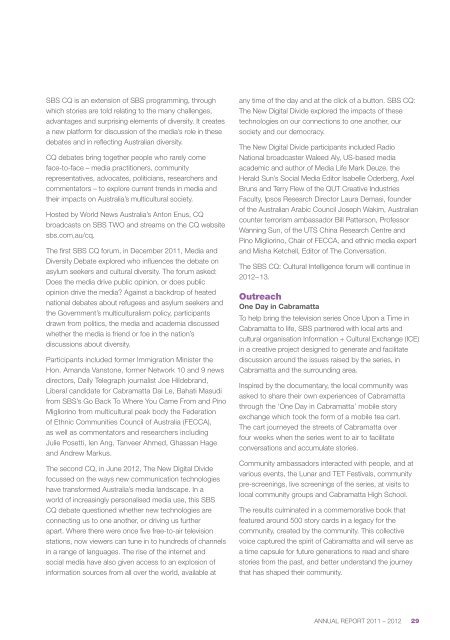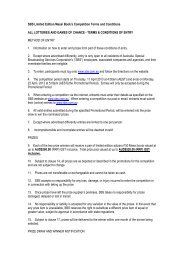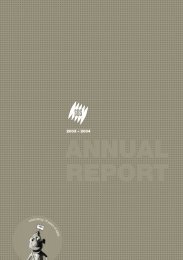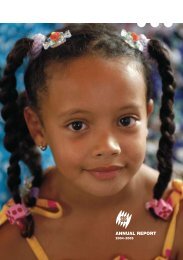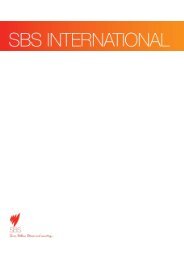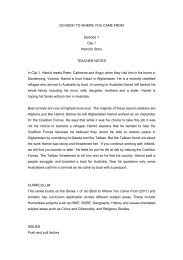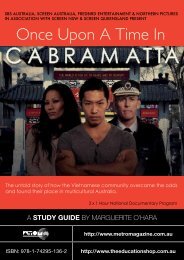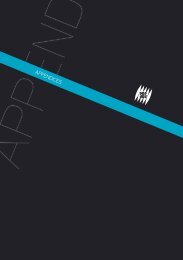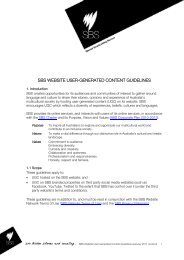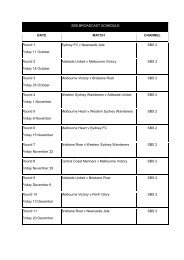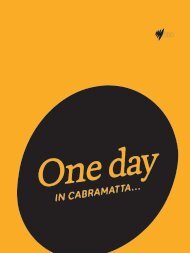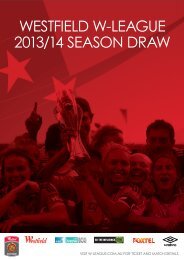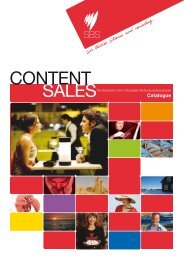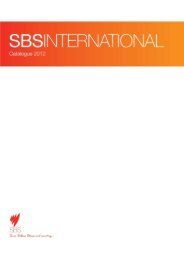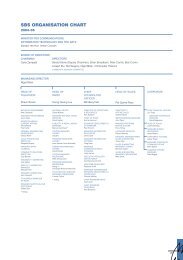AnnuAl REPORT 2011-2012 - Sbs
AnnuAl REPORT 2011-2012 - Sbs
AnnuAl REPORT 2011-2012 - Sbs
- TAGS
- annual
- media.sbs.com.au
Create successful ePaper yourself
Turn your PDF publications into a flip-book with our unique Google optimized e-Paper software.
SbS cQ is an extension of SbS programming, through<br />
which stories are told relating to the many challenges,<br />
advantages and surprising elements of diversity. it creates<br />
a new platform for discussion of the media’s role in these<br />
debates and in reflecting Australian diversity.<br />
cQ debates bring together people who rarely come<br />
face-to-face – media practitioners, community<br />
representatives, advocates, politicians, researchers and<br />
commentators – to explore current trends in media and<br />
their impacts on Australia’s multicultural society.<br />
Hosted by World News Australia’s Anton enus, cQ<br />
broadcasts on SbS tWO and streams on the cQ website<br />
sbs.com.au/cq.<br />
the first SbS cQ forum, in December <strong>2011</strong>, Media and<br />
Diversity Debate explored who influences the debate on<br />
asylum seekers and cultural diversity. the forum asked:<br />
Does the media drive public opinion, or does public<br />
opinion drive the media? Against a backdrop of heated<br />
national debates about refugees and asylum seekers and<br />
the Government’s multiculturalism policy, participants<br />
drawn from politics, the media and academia discussed<br />
whether the media is friend or foe in the nation’s<br />
discussions about diversity.<br />
Participants included former immigration Minister the<br />
Hon. Amanda vanstone, former Network 10 and 9 news<br />
directors, Daily telegraph journalist joe Hildebrand,<br />
Liberal candidate for cabramatta Dai Le, bahati Masudi<br />
from SbS’s Go back to Where You came From and Pino<br />
Migliorino from multicultural peak body the Federation<br />
of ethnic communities council of Australia (FeccA),<br />
as well as commentators and researchers including<br />
julie Posetti, ien Ang, tanveer Ahmed, Ghassan Hage<br />
and Andrew Markus.<br />
the second cQ, in june <strong>2012</strong>, the New Digital Divide<br />
focussed on the ways new communication technologies<br />
have transformed Australia’s media landscape. in a<br />
world of increasingly personalised media use, this SbS<br />
cQ debate questioned whether new technologies are<br />
connecting us to one another, or driving us further<br />
apart. Where there were once five free-to-air television<br />
stations, now viewers can tune in to hundreds of channels<br />
in a range of languages. the rise of the internet and<br />
social media have also given access to an explosion of<br />
information sources from all over the world, available at<br />
any time of the day and at the click of a button. SbS cQ:<br />
the New Digital Divide explored the impacts of these<br />
technologies on our connections to one another, our<br />
society and our democracy.<br />
the New Digital Divide participants included Radio<br />
National broadcaster Waleed Aly, US-based media<br />
academic and author of Media Life Mark Deuze, the<br />
Herald Sun’s Social Media editor isabelle Oderberg, Axel<br />
bruns and terry Flew of the QUt creative industries<br />
Faculty, ipsos Research Director Laura Demasi, founder<br />
of the Australian Arabic council joseph Wakim, Australian<br />
counter terrorism ambassador bill Patterson, Professor<br />
Wanning Sun, of the UtS china Research centre and<br />
Pino Migliorino, chair of FeccA, and ethnic media expert<br />
and Misha Ketchell, editor of the conversation.<br />
the SbS cQ: cultural intelligence forum will continue in<br />
<strong>2012</strong>–13.<br />
outreach<br />
One Day in Cabramatta<br />
to help bring the television series Once Upon a time in<br />
cabramatta to life, SbS partnered with local arts and<br />
cultural organisation information + cultural exchange (ice)<br />
in a creative project designed to generate and facilitate<br />
discussion around the issues raised by the series, in<br />
cabramatta and the surrounding area.<br />
inspired by the documentary, the local community was<br />
asked to share their own experiences of cabramatta<br />
through the ‘One Day in cabramatta’ mobile story<br />
exchange which took the form of a mobile tea cart.<br />
the cart journeyed the streets of cabramatta over<br />
four weeks when the series went to air to facilitate<br />
conversations and accumulate stories.<br />
community ambassadors interacted with people, and at<br />
various events, the Lunar and tet Festivals, community<br />
pre-screenings, live screenings of the series, at visits to<br />
local community groups and cabramatta High School.<br />
the results culminated in a commemorative book that<br />
featured around 500 story cards in a legacy for the<br />
community, created by the community. this collective<br />
voice captured the spirit of cabramatta and will serve as<br />
a time capsule for future generations to read and share<br />
stories from the past, and better understand the journey<br />
that has shaped their community.<br />
<strong>AnnuAl</strong> RepoRt <strong>2011</strong> – <strong>2012</strong> 29


